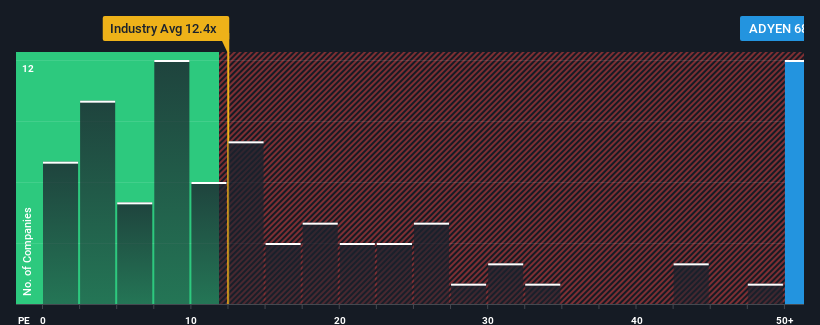- Netherlands
- /
- Diversified Financial
- /
- ENXTAM:ADYEN
Earnings Tell The Story For Adyen N.V. (AMS:ADYEN) As Its Stock Soars 26%

Adyen N.V. (AMS:ADYEN) shares have continued their recent momentum with a 26% gain in the last month alone. Looking further back, the 22% rise over the last twelve months isn't too bad notwithstanding the strength over the last 30 days.
Following the firm bounce in price, given close to half the companies in the Netherlands have price-to-earnings ratios (or "P/E's") below 17x, you may consider Adyen as a stock to avoid entirely with its 68.8x P/E ratio. Nonetheless, we'd need to dig a little deeper to determine if there is a rational basis for the highly elevated P/E.
Adyen certainly has been doing a good job lately as it's been growing earnings more than most other companies. It seems that many are expecting the strong earnings performance to persist, which has raised the P/E. If not, then existing shareholders might be a little nervous about the viability of the share price.
Check out our latest analysis for Adyen

Does Growth Match The High P/E?
There's an inherent assumption that a company should far outperform the market for P/E ratios like Adyen's to be considered reasonable.
Retrospectively, the last year delivered an exceptional 46% gain to the company's bottom line. The strong recent performance means it was also able to grow EPS by 116% in total over the last three years. So we can start by confirming that the company has done a great job of growing earnings over that time.
Looking ahead now, EPS is anticipated to climb by 24% per annum during the coming three years according to the analysts following the company. Meanwhile, the rest of the market is forecast to only expand by 15% per year, which is noticeably less attractive.
With this information, we can see why Adyen is trading at such a high P/E compared to the market. Apparently shareholders aren't keen to offload something that is potentially eyeing a more prosperous future.
What We Can Learn From Adyen's P/E?
Shares in Adyen have built up some good momentum lately, which has really inflated its P/E. Using the price-to-earnings ratio alone to determine if you should sell your stock isn't sensible, however it can be a practical guide to the company's future prospects.
We've established that Adyen maintains its high P/E on the strength of its forecast growth being higher than the wider market, as expected. At this stage investors feel the potential for a deterioration in earnings isn't great enough to justify a lower P/E ratio. Unless these conditions change, they will continue to provide strong support to the share price.
We don't want to rain on the parade too much, but we did also find 1 warning sign for Adyen that you need to be mindful of.
If you're unsure about the strength of Adyen's business, why not explore our interactive list of stocks with solid business fundamentals for some other companies you may have missed.
New: Manage All Your Stock Portfolios in One Place
We've created the ultimate portfolio companion for stock investors, and it's free.
• Connect an unlimited number of Portfolios and see your total in one currency
• Be alerted to new Warning Signs or Risks via email or mobile
• Track the Fair Value of your stocks
Have feedback on this article? Concerned about the content? Get in touch with us directly. Alternatively, email editorial-team (at) simplywallst.com.
This article by Simply Wall St is general in nature. We provide commentary based on historical data and analyst forecasts only using an unbiased methodology and our articles are not intended to be financial advice. It does not constitute a recommendation to buy or sell any stock, and does not take account of your objectives, or your financial situation. We aim to bring you long-term focused analysis driven by fundamental data. Note that our analysis may not factor in the latest price-sensitive company announcements or qualitative material. Simply Wall St has no position in any stocks mentioned.
About ENXTAM:ADYEN
Adyen
Operates a payments platform in Europe, the Middle East, Africa, North America, the Asia Pacific, Latin America.
Outstanding track record with excellent balance sheet.
Similar Companies
Market Insights
Community Narratives




